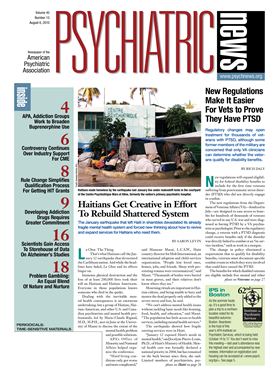On June 11, a consortium of drug companies, research foundations, and patient-advocacy organizations announced that data on more than 4,000 subjects who had participated in 11 drug-company-sponsored Alzheimer's disease trials were being released to qualified scientists throughout the world.
The consortium, known as the Coalition Against Major Diseases (CAMD), also includes advisors from government research and regulatory agencies including the Food and Drug Administration (FDA).
Psychiatrists and other Alzheimer's disease specialists whom Psychiatric News queried about the announcement expressed mostly positive sentiments about the upcoming release.
“I think data sharing is great, and it's unusual to see companies working together like this,” said David Bennett, M.D., director of the Alzheimer's Disease Center at Rush University.
“I am aware of, and enthusiastic about, the idea of the database,” Allan Levey, M.D., director of the Alzheimer's Disease Center at Emory University, commented. “The transparency and open sharing of data can only help in the quest to develop treatments for Alzheimer's. I haven't yet seen the actual data available, but look forward to seeing how they can be used productively.”
“The process of pooling databases to get larger amounts of data has potentially a very good purpose because it will facilitate research,” Herbert Pardes, M.D., president and CEO of New York Presbyterian Hospital in New York City, said. “I assume that the people who put it together removed any information that could identify the patients involved. If so, then I think it is a generally positive development.” Pardes is a former director of the National Institute of Mental Health (NIMH) and a past APA president.
“I am thrilled that the CAMD has reached this milestone and made public these new data from more than 4,000 Alzheimer's disease patients who have participated in industry-sponsored clinical trials,” Freda Lewis-Hall, M.D., a psychiatrist and chief medical officer at Pfizer, stated. “This open sharing of information, through a common standard, and with all needed patient-privacy protections, is essential to energizing the drive for Alzheimer's treatments and in building on the hard-won knowledge gained, patient by patient, in the clinic. I'm proud that Pfizer is part of the coalition, and that we are among the leaders in Alzheimer's research and support.”
“The National Institute of Mental Health has been encouraging data sharing at many levels and from many sources,” said Thomas Insel, M.D., director of NIMH. “While there is nothing comparable to this new database for Alzheimer's clinical trials, with the Foundation for the National Institutes of Health, we have begun discussions about sharing precompetitive data for discovering biomarkers relevant to the diagnosis and treatment of mental disorders.”
There are a number of ways in which the data release could benefit Alzheimer's research, Lawrence Honig, M.D., Ph.D., director of the Clinical Core of the Alzheimer's Disease Research Center at Columbia University, pointed out. For example, since detailed information about subjects who participated in the trials will now be made available to qualified outside scientists, it could help these researchers answer important questions about biomarkers, disease progression, the placebo groups, or other aspects of the trials that they might not otherwise be able to answer. Having access to such detailed information could also give the scientists the opportunity to analyze the data themselves and to validate or expand upon what the initial trials showed.
“So I think it is extremely valuable to have wide investigator access to patient-level data of completed clinical trials,” said Honig. “However, I want to reassure people who have participated in these trials that there is absolutely no way to identify them and where they come from. I also noticed that when I applied for access to these data, I had to certify that I would never make an attempt to identify subjects in the database.”
In addition to combining Alzheimer's clinical-trials data from drug companies and making such data available to scientists throughout the world, the CAMD has other goals—for instance, improving the design of Alzheimer's trials. Ronald Petersen, M.D., Ph.D., an Alzheimer's scientist at the Mayo Clinic, is advising the CAMD in an unpaid capacity to achieve this goal, he told Psychiatric News. “They are proposing to improve the design of trials by examining the performance of individuals in previous trials, usually the placebo groups, to design better metrics. Ultimately they would like to influence the FDA on optimizing study designs.”
The CAMD was formed by C-Path, an independent nonprofit institute created by the University of Arizona and the FDA in 2005. It is based in Tucson, Ariz. C-Path's mission is to bring scientists from academia, the pharmaceutical industry, biotechnology companies, and the government together to get new drugs, devices, and biological products to patients as quickly as possible.
